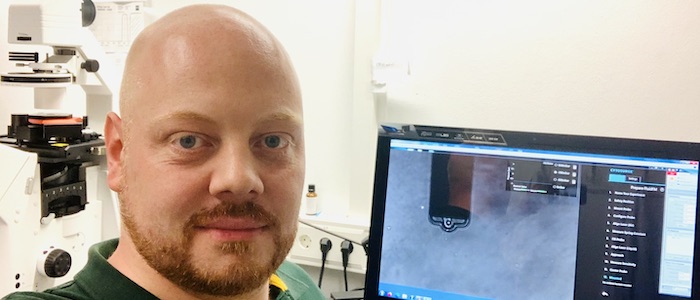Jan Philipp Jung

Institute for Medical Microbiology and Hygiene
Saarland University, Geb. 43
66421 Homburg
Philipp Jung
…is an infection biologist with a special interest in the biophysical aspects of host-pathogen interaction and cellular adhesion processes. He studied biotechnology & bioprocess engineering at Kaiserslautern University (Germany) and investigated the formation of appressoria (pressurised adhesive discs) in plant pathogenic fungi. In 2017, he obtained a Dr. rer. nat in medical microbiology at Saarland University (Germany), investigating host adaptation strategies of livestock-associated Staphylococcus aureus. Philipp joined the Collaborative Research Center 1027 (Physical modelling of non-equilibrium processes in biological systems) at Saarland University (Germany) in 2017 as a postdoctoral researcher. There, he studied cellular adhesion processes of microbial pathogens to host structures and medical implants. Since 2021, Philipp leads a research group on host-pathogen interactions and microbial adhesion at the Institute of Medical Microbiology and Hygiene at Saarland University (Germany).
Research synopsis
Microbial adhesion is one of the basic principles of biology. In infection biology, an initial mechanical contact between pathogen and host is the basic condition and prelude for a large number of other interactions. For this reason, pathogens have developed a variety of intriguing strategies to make this contact. Philipp aims to understand biophysical mechanisms that mediate microbial adhesion to biotic surfaces (e.g. epithelial and endothelial cells) or abiotic surfaces, such as medical devices or structured model surfaces. He and his team are interested in a broad spectrum of organism groups, including bacterial, fungal and protist pathogens. For this purpose, they utilise various atomic force microscopy (AFM) techniques, including single cell force spectroscopy, single molecule spectroscopy, AFM-based elasticity mapping and nanofluidic setups.
As part of this consortium, Philipp aims to contribute to the understanding of the structural basis of Giardia duodenalis adhesion, which is mediated by an intriguing microtubule-based organelle, the adhesive disc.
This study is Project 1 of the SPP 2332 PoP.






